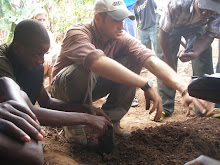 |
| African bees aren't so mean! |
Monday morning we started the process of packing honey into jars at the LIDEFO. I asked that I could just watch how they normally do it, and give my suggestions after the fact. So when Jockus arrived he started his usual process. First he started a fire, which right away surprised me. "You are pasteurizing the honey?" I asked. "No, we just heat a little because the honey becomes hard when it stays a long time," he explained. I looked at the honey which looked liquified to me, but went along anyways.
 |
| stones to keep the bucket off of the bottom of the pot |
 |
| lightly heating the honey |
At first I was adamant that they shouldn't heat the honey because it breaks down the sugars and produces a byproduct hydroxymethylfufuraldehyde (try saying that five times fast, or even once slowly, or just say HMF.) Everything I have read says that to sell on international markets you have your honey tested for it's HMF value. The higher the HMF, the lower the quality of the honey. Joukus understood this point very well, but he explained that once the honey granulates (crystalizes) in the jar, then people can't buy it in Kasese. He made a great point. For now, it doesn't really matter what the international markets want, what matters is trying to dominate the local market, since their aren't any other local honey packers near Kasese. We agreed that once the LIDEFO outstrips the local demand, and is ready to move onto markets further abroad, then maybe they could start to institute my suggestion not to pasteurize.
 |
| filtering the honey |
After the honey was warmed then Jockus poured the honey through one of the stainless steel double filters that Bee Commerce donated.....Thank you good folks at Bee Commerce!
Finally he poured the honey into the settling tank where it is mixed with all of the other honey, and it is left to sit for at least 24 hours so any other imperfections can rise to the top. Then Jockus will again scrape the little remaining wax and pollen that rises out and he will start pouring the honey through the honey gate to fill jars for selling at local super markets. I will miss this step as it has to happen soon since the buyers are starting to clamor and I will be busy with farmer trainings.


3 comments:
Once again, enjoying your writing about your adventures, Dan. Great job!
June
I guess the local folks don't want to buy crystallized honey assuming it is inferior?
Perhaps it could be marketed as "raw" honey and better for you more enzymes like our "health " food stores do?
Thanks June! Yeah Ralph, I suggested that to the group, as well as making creamed honey and marketing it as a spread. I think these things just take time. It's hard for people to change away from what they are used to buying.
Post a Comment